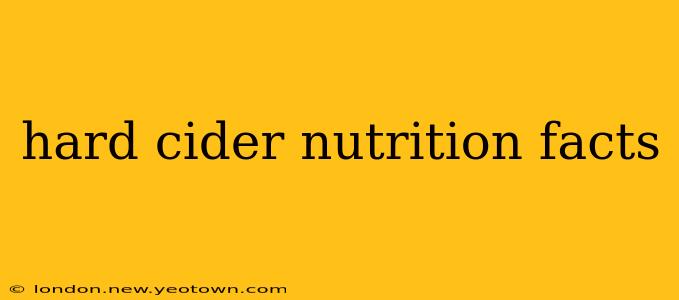Hard cider, that crisp and bubbly beverage, has surged in popularity. But beyond its delightful taste, what's the nutritional profile of this fermented apple juice? Let's delve into the hard cider nutrition facts and unravel some common questions.
Imagine a sun-drenched orchard, the air thick with the sweet scent of ripe apples. These apples, the heart of hard cider, undergo a transformation, becoming a drink with a unique nutritional makeup. While it offers some benefits, moderation is key, as with any alcoholic beverage.
What are the typical nutritional values in hard cider?
This is a tricky question because the nutritional content of hard cider varies wildly depending on several factors: the type of apples used, the brewing process, added sugars, and even the brand. However, we can look at some general ranges. A typical 12-ounce serving of hard cider might contain:
- Calories: Around 150-200 calories. This can be significantly higher if the cider is sweeter or contains added sugars.
- Carbohydrates: 10-20 grams. Again, sweetness levels play a large role here.
- Sugar: This is highly variable but can range from a few grams in drier ciders to over 20 grams in sweeter varieties.
- Alcohol: Approximately 5% alcohol by volume (ABV). This is similar to many beers and wines.
- Vitamins and Minerals: Hard cider retains some of the vitamins and minerals present in apples, though the quantities are often less than in fresh juice due to fermentation. You might find small amounts of vitamin C, potassium, and other micronutrients.
Does hard cider have any health benefits?
The health benefits of hard cider are primarily linked to the apples from which it's made. Apples are a good source of fiber, antioxidants, and various vitamins. However, fermentation significantly alters the nutritional profile, and the alcohol content introduces potential downsides. It's crucial to remember that any potential health benefits are greatly outweighed by the risks associated with excessive alcohol consumption. Some proponents might point to the potential antioxidant benefits from the apple polyphenols, but more research is needed to confirm specific health advantages.
Is hard cider good for weight loss?
Hard cider is not generally considered a weight-loss-friendly beverage. The calorie and carbohydrate content, particularly in sweeter varieties, can contribute to weight gain if consumed in excess. The calories from alcohol are "empty calories," meaning they provide energy without significant nutritional value. Choosing a dry cider with fewer added sugars might minimize this impact, but mindful consumption remains crucial.
How does hard cider compare to other alcoholic beverages in terms of nutrition?
Compared to other alcoholic beverages, hard cider’s nutritional profile falls somewhere in the middle. It generally has fewer calories than many cocktails but more than some light beers. Its sugar content is highly variable, ranging from relatively low in dry varieties to quite high in sweeter options. The comparison is complex and depends heavily on the specific drink being compared.
Is hard cider gluten-free?
Naturally produced hard cider is generally gluten-free. However, always check the label, as some ciders might contain added ingredients that contain gluten. Some cider makers also utilize gluten-containing grains during the fermentation process, which can affect the final product.
How can I choose a healthier hard cider option?
If you're looking for a slightly healthier option, opt for dry ciders, which typically have lower sugar content. Also, pay attention to the serving size and try to limit your intake to moderate amounts. Reading labels carefully can help you make informed choices about added sugars and other ingredients.
Disclaimer: This information is for educational purposes only and does not constitute medical advice. Consult a healthcare professional before making any significant dietary changes, especially if you have underlying health conditions or concerns about alcohol consumption. Remember to always drink responsibly and in moderation.

